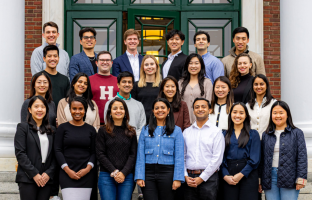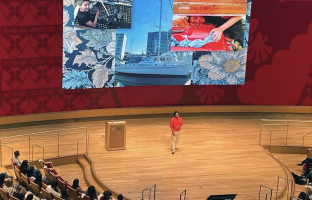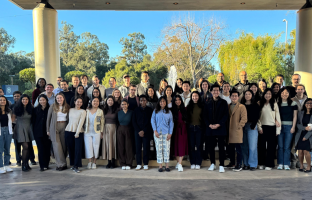Editor’s Note: The below post is part of our Alumni for Impact series, which features alumni who are making a difference in the social sector, specifically in K-12 education, impact investing, nonprofit supportive services and social entrepreneurship. Robin Lee Greiner (MBA 1997) is the Chief Operating Officer of Accion Chicago, a nonprofit that helps communities grow by providing capital, coaching and connections to aspiring entrepreneurs who build businesses and generate jobs in their neighborhoods.
I spent most of my career harnessing the power of business to effect positive social change. Before and after attending HBS, I helped grow Working Assets (now Credo, founded by Laura Scher, MBA 1985) into a successful social enterprise that has generated more than $80 million for nonprofits. Whereas Working Assets is a for-profit enterprise whose business model includes 1% of revenue being donated to nonprofits, Accion Chicago is a nonprofit organization whose purpose is to build communities through entrepreneurship.
We all know that small business is the growth engine of any economy. This is even more true for distressed communities where jobs are hard to come by, crime rates are high and access to fresh food is limited. To deepen Accion’s impact and with an eye towards Accion’s long term sustainability, I spent the better part of the last four years spearheading a joint venture to create The Hatchery Chicago, a $34 million facility that will be the region’s premier food and beverage business incubator when it opens later this year.
Located right next to a public transportation stop, the new facility will spur economic activity in one of Chicago’s highest need neighborhoods, East Garfield Park on Chicago’s west side. The Hatchery will provide wealth and job creation by bringing together entrepreneurs and neighborhood residents to offer employment opportunities in the labor-intensive food industry. Based on the hiring patterns of Accion’s existing clients in the food space, we estimate that 900 jobs will be created or retained in the first five years of operation, producing pre-tax wages of nearly $25 million.
Chicago food entrepreneurs face obstacles that limit their ability to start and grow businesses. Specifically, they lack access to affordable, food grade production space, high quality business support services, financing and a trained workforce. The Hatchery Chicago will remove these barriers by providing rentable private and shared kitchen space, cold and dry storage, shipping and loading docks, and general meeting and work space. It will also offer industry-specific coaching and support services. Accion will even move its office to The Hatchery so entrepreneurs can easily access working capital as they grow.
The Hatchery will also house a culinary institute led by celebrity chef Rick Bayless and other high profile local chefs. This program will focus primarily on neighborhood youth between 18-24 years who face an alarming 81.3% unemployment rate. Not only will this training program serve as a pipeline for industry-trained employees for the businesses located at The Hatchery, but it will also provide a path for a culinary career to young people who lack positive employment opportunities. At the same time, it will address a business problem facing most Chicago restaurants—not having enough well-trained employees in their kitchens.
Finally, The Hatchery will also improve access to affordable, fresh food in the neighborhood. For several years, the Garfield Park Community Council has been running a network of kitchen gardens and selling the produce on the site where we intended to build. Instead of disrupting something positive that community members had created, together we figured out a way to incorporate the market into the building design. The market will take place on a paved plaza and will have dedicated space to prep produce and store equipment. Perhaps the best outcome of all is that the tenacious people who started the gardens and market have a deep sense of pride that The Hatchery is essentially building on what they got started on the weedy field.
Putting together the $34 million of financing was a challenge requiring dogged tenacity and creativity from all parties to make it work. In the end, the complex capital stack included: New Markets Tax Credit investors, Tax Increment Financing (TIF) from the City of Chicago, various levels of debt, a land grant from the City, and contributions from foundations, corporations and individuals. Among the major donors are The Kellogg Company and Conagra Brands who see The Hatchery as a way to help them innovate.
By transforming a city designated ‘food desert’ into a thriving economic food and beverage cluster on Chicago’s west side, The Hatchery will help to revitalize a neighborhood without displacing people as is so often the case in development projects. Indeed, it actually builds on the resourcefulness and commitment of many current residents.
This has been an incredibly positive collaboration that generated support and enthusiasm across all sectors from the start. It makes sense as it’s big win for everyone. But, when more than 100 people show up on a terribly rainy day in October for a groundbreaking ceremony (pictured above), you know people are excited.
The Hatchery Chicago could only have come together through intense collaboration, finding common cause and creatively addressing the key issues facing each party. It’s a true testament to what can happen when nonprofits, community members, banks, corporations, city government, foundations and individuals collaborate to find solutions to address seemingly intractable problems.
I could not be more proud of my involvement in this transformative project. I employed much of what I learned at HBS to make it happen. It’s a terrific end cap on a career focused on making the world a better place. Hopefully, The Hatchery will serve as a model that will be replicated across the country.
This blog post was originally published on the Social Enterprise Impact Insights blog.





.png&w=80&h=80)

.png&w=80&h=80)